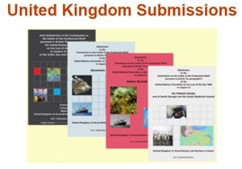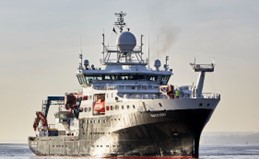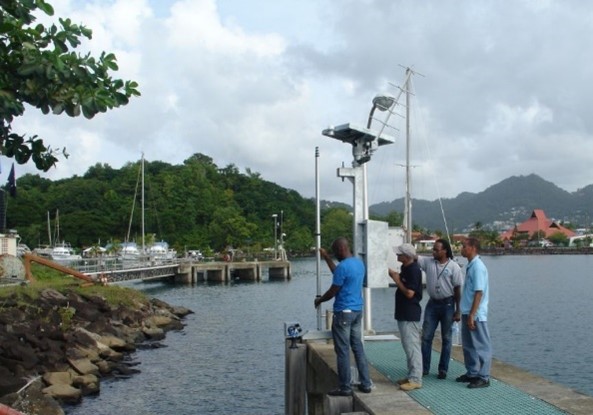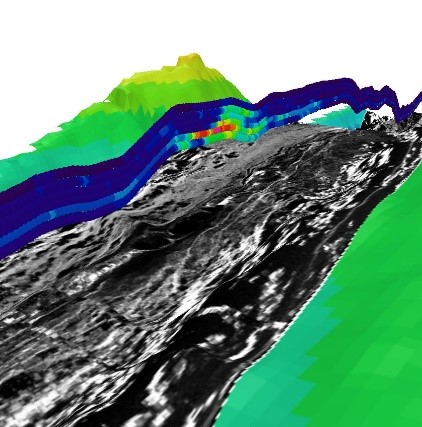Governance of ocean space in terms of resource use and environmental protection falls within the international statute of the United Nations Convention on the Law of the Sea (UNCLOS). UK government departments require specialised technical advice from marine experts in a range of disciplines in order to develop and monitor UK maritime policy in this legal framework. With expertise in the implementation of several Parts of UNCLOS the NOC has a particular successful track record in supporting the UK Government, and others, in the implementation of the following items.
Part VI – Article 76: continental shelf

The UNCLOS defines the limit of the continental shelf through the provisions contained in Article 76. With a great reliance on the geological and geomorphological understanding of the sea floor and the sub-surface the NOC provided the technical lead in the delivery of all four UK submissions for continental shelf beyond 200 nautical miles.
The NOC continues to provide technical advisory services and support on issues related to the continental shelf maritime space, marine resource exploration, exploitation and support for technical negotiations with neighbouring coastal states on overlapping territorial claims.
Part XI – International Seabed Authority (ISA)
The International Seabed Authority is an intergovernmental organization established under the UNCLOS and the 1994 Agreement relating to the Implementation of Part XI of the UNCLOS. The Authority is the organization through which States Parties to the Convention shall, in accordance with the regime for the seabed and ocean floor and subsoil thereof beyond the limits of national jurisdiction (the Area) established in Part XI and the Agreement, organize and control activities in the Area, particularly with a view to administering the resources of the Area.
The NOC has a longstanding history working with the ISA in delivering independent and impartial advice through technical reports and participation in ISA events. In 2024 the NOC became an official observer at the ISA with am ambition to promote good governance in support of the implementation of Part XI.
Part XIII – Marine scientific research

As the leading UK organisation undertaking marine scientific research from the coast to the deep sea Part XIII of UNCLOS is particularly pertinent. Not only in guiding NOC researchers when carrying out their work, either in waters within or beyond national jurisdiction, but in also providing the framework by which NOC, as managers of two ocean class research vessels must adhere to international standards in the delivery of knowledge generation, including the provisions to make data available and to allow the participation of others on expeditions managed through NOC Marine Facilities.
Part XIV – Transfer of marine technology

Through the provision of technical advice and inclusion of partners, in particular from developing states, the NOC endeavours to support the delivery of the transfer of marine technology as defined in the IOC Criteria and Guidelines on the Transfer of Marine Technology (CGTMT). Through international development projects and working with marine scientific research organisations worldwide the NOC strives to build partnerships to support the goal of developing capacity such that all States can contribute to global ocean governance. And through our engagement at international forum the NOC is pro active in fostering a narrative of leave no one behind.
Agreement under the United Nations Convention on the Law of the Sea on the Conservation and Sustainable Use of Marine Biological Diversity of Areas beyond National Jurisdiction (BBNJ)
Under the overall objective of the conservation and sustainable use of marine biological diversity of areas beyond national jurisdiction through effective implementation of the relevant provisions of the Convention and further international cooperation and coordination, the Agreement addresses four main issues:
- Marine genetic resources, including the fair and equitable sharing of benefits;
- Measures such as area-based management tools, including marine protected areas;
- Environmental impact assessments; and
- Capacity-building and the transfer of marine technology.
The Agreement also addresses several “cross-cutting issues”, establishes a funding mechanism and sets up institutional arrangements, including a Conference of the Parties and various subsidiary bodies, a Clearing-House Mechanism and a secretariat.
The NOC provided the only non-Government member of the UK Delegation during the Intergovernmental Conference (IGC) negotiations, providing scientific and technical support in the development of UK positions. The NOC continues to support UK Government in the development of domestic legislation as well as working with NERC-UKRI and other UK agencies in preparation for implementing the Agreement once the UK Government ratifies.
IOC-UNESCO

As the competent UN agency for ocean science and services the Intergovernmental Oceanographic Commission of UNESCO (IOC-UNESCO) promotes international cooperation in marine sciences to improve management of the ocean, coasts and marine resources. The IOC enables its 150 Member States to work together by coordinating programmes in capacity development, ocean observations and services, ocean science, tsunami warning and ocean literacy.
The NOC provides the UK Delegation to the IOC-UNESCO, ensuring UK interests are taken into account in the delivery and development of global programmes. See UK-IOC for more information.
UK Overseas Territories
Ocean Governance is increasing in importance to order to enable responsible use of marine estates, allowing the development of marine resources for today and stewardship of the marine environment for future generations. To this end the NOC compiled a number of elements that will enable the UK’s Overseas Territories recognise what data and information is readily available for use in ocean management. Marine Spatial Planning is fast becoming a valuable approach to balancing the many competing demands in the use of marine space, and recognising the framework and data demands is of key importance to sustaining successful marine plans.
To this end we are developing an on-line GIS which includes information relating to the UK's Overseas Territories in the Caribbean (other OTs will be added) where details of current maritime limits and boundaries and multibeam bathymetry data can be found (once the web page loads, be sure to click the contents tab to view additional layers). Each feature layer has associated brief metadata with links to more information.
This programme will continue to develop and provide more information relevant to enabling sustainable use of the marine environment. However should you have any information that you regard as relevant please get in touch.
NOC Marine Geoscience data

This page provides a shortcut to an on-line GIS developed by the Marine Geoscience Group in order to provide direct access to survey track lines of scientific expeditions by members of the Group (as well as it predecessor groups). Each track line has associated hyperlinks which provide access to cruise reports, BODC cruise summary reports, data and desktop GIS projects. However for external users, access is restricted to the cruise reports and BODC cruise summary reports.
In total, the online GIS holds over 175 survey track lines, primarily onboard NERC vessels (RRS James Cook, RRS James Clark Ross, RRS Discovery, RRS Charles Darwin). Data has been archived and is readily accessible for 167 expeditions; 131 within the SeaDOG data archive, and a further 36 have readily available cruise data and desktop ArcGIS projects.
View the ship location map, however please be patient, the GIS takes time to load.
FOR INTERNAL USE ONLY. To assist with access to cruise data and GIS projects please read the supporting documentation (be sure to map to the “p” drive): data portal, Data Archive Structure and GIS uploads. Note also, in order to access the Seadog database you will need to map to the “q” drive.
For further information on the above or any other UNCLOS related query please contact:
Alan Evans, NOC Head of Marine Policy at unclos@noc.ac.uk